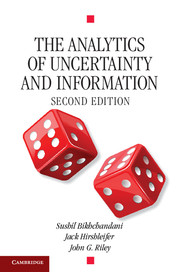Book contents
- Frontmatter
- Contents
- Acknowledgments
- In Memoriam
- Introduction
- Part I
- Part II
- 5 Information and Informational Decisions
- 6 Information and Markets
- 7 Strategic Uncertainty and Equilibrium Concepts
- 8 Informational Asymmetry and Contract Design
- 9 Competition and Hidden Knowledge
- 10 Market Institutions
- 11 Long-Run Relationships and the Credibility of Threats and Promises
- 12 Information Transmission, Acquisition, and Aggregation
- Index
- References
11 - Long-Run Relationships and the Credibility of Threats and Promises
Published online by Cambridge University Press: 05 August 2013
- Frontmatter
- Contents
- Acknowledgments
- In Memoriam
- Introduction
- Part I
- Part II
- 5 Information and Informational Decisions
- 6 Information and Markets
- 7 Strategic Uncertainty and Equilibrium Concepts
- 8 Informational Asymmetry and Contract Design
- 9 Competition and Hidden Knowledge
- 10 Market Institutions
- 11 Long-Run Relationships and the Credibility of Threats and Promises
- 12 Information Transmission, Acquisition, and Aggregation
- Index
- References
Summary
The last few chapters investigated strategic interaction between players in a variety of settings. However, the analysis presumed a one-time interaction among players. This chapter inquires into the further strategic opportunities that are introduced when individuals interact with one another repeatedly.
Long-run relationships lead to two types of phenomenon. First, the set of utility payoffs that can be supported as equilibrium outcomes expands. This may be achieved by threatening to punish opponents in later periods of play if they deviate from a sequence of actions that yields the desired utility payoffs. Second, an individual with private information should be able to make favorable information about himself (information that he is a high-quality or otherwise desirable trading partner) credible by actions taken in the early periods of a long-run relationship. That is, an individual should be able to develop a reputation.
The Multi-Period Prisoners’ Dilemma
Let us begin by examining the Prisoners’ Dilemma. In Table 11.1, each individual i(i = 1, 2) may choose to play either “Defect” (strategy x1) or “Cooperate” (strategy x2). The Prisoners’ Dilemma environment is defined by the ranked payoffs in Table 11.1 if e > f > g > h. Table 11.2 is a numerical example.
- Type
- Chapter
- Information
- The Analytics of Uncertainty and Information , pp. 422 - 452Publisher: Cambridge University PressPrint publication year: 2013



